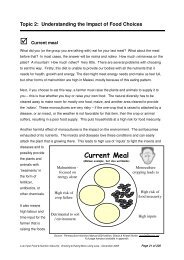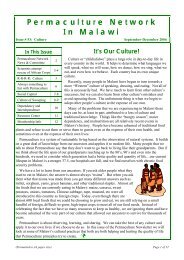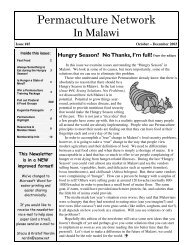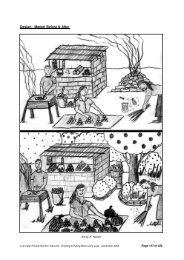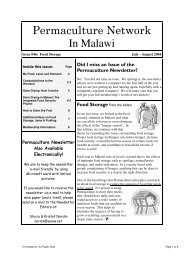Permaculture, Final Capstone Paper 5-26, Hope - Never Ending Food
Permaculture, Final Capstone Paper 5-26, Hope - Never Ending Food
Permaculture, Final Capstone Paper 5-26, Hope - Never Ending Food
Create successful ePaper yourself
Turn your PDF publications into a flip-book with our unique Google optimized e-Paper software.
literature suggests that income earned from agricultural sales indicates close proximity to<br />
markets therefore an incentive to intensify agricultural production. Unfortunately this research<br />
lacks both the quantitative and qualitative data regarding access to markets.<br />
Fifteen (60%) participants are male and 12 (40%) are female. An Independent Sample T-<br />
test shows that men scored an average of 4 points higher than women. Gender was not<br />
qualitatively explored in this research, although it would be interesting to explore the reasons for<br />
a higher adoption score among men especially since human capital does not seem to be<br />
associated with adoption scores.<br />
PLOT LEVEL CHARACTERISTICS<br />
While not statistically significant (likely the result of small sample size), a Pearson<br />
correlation tests showed that <strong>Permaculture</strong> adoption scores were negatively associated (albeit<br />
weakly, .27) with acres rented, and positively associated (weakly, .18) with income. The test did<br />
however show statistical significance at the .01 level of a strong linear relationship (0.51)<br />
between adoption score and acres owned. This data strongly supports the theme of land tenure<br />
security, which emerged from the qualitative data. Secure access to a “munda”, or agricultural<br />
production zone, is necessary over the long term. Because <strong>Permaculture</strong> is permanent<br />
agriculture, many farmers do not feel that they will realize the benefits of <strong>Permaculture</strong> if they<br />
do not own their own land and/or do not have secured access to rented land for more than one<br />
growing season. Similarly, Neill and Lee (2001) found that adoption and continuation of the<br />
maize-mucuna systems is positively associated with a perception of secure and tenured access to<br />
the same agricultural lands as it typically takes two to three years to benefits from the systems.<br />
In Kanengo, one woman (ID24, adopter and renter), spoke at length about the lack of<br />
control she has regarding the fertility of the soil “because sometimes, people can use that land<br />
without applying manure.” Another adopter and renter from Kanengo (ID12) indicated that in<br />
35



